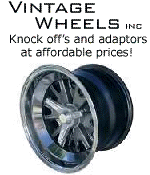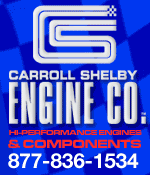 
 Main Menu
Main Menu
|
 Nevada Classics
Nevada Classics
|
 Advertise at CC
Advertise at CC
|
 December 2024
December 2024
|
| S |
M |
T |
W |
T |
F |
S |
| 1 |
2 |
3 |
4 |
5 |
6 |
7 |
| 8 |
9 |
10 |
11 |
12 |
13 |
14 |
| 15 |
16 |
17 |
18 |
19 |
20 |
21 |
| 22 |
23 |
24 |
25 |
26 |
27 |
28 |
| 29 |
30 |
31 |
|
|
|
|
|
 CC Advertisers
CC Advertisers
|
|

03-24-2008, 05:03 PM
|
|
CC Member

|
|
|
Join Date: Jul 2006
Cobra Make, Engine:
Posts: 49
|
|

 Not Ranked
Not Ranked
 Water/alchol injection
Water/alchol injection
Has anyone had any first hand experience with it? Can I expect It to increase octane ratings. Thanks.
|
-
Advertising


03-24-2008, 05:13 PM
|
|
Senior Club Cobra Member

|
|
|
Join Date: Jul 2000
Location: Las Vegas,
NV
Cobra Make, Engine: ERA 427 SO
Posts: 1,126
|
|

 Not Ranked
Not Ranked
Does not increase octane rating, cools the intake charge to help reduce pre-ignition, keeps the combustion surfaces a lot cleaner, reduces the total amount of available energy in the intake charge by reducing the total volume of fuel/air mixture (displaces fuel and air in the intake charge), but you might be able to make it up through more timing advance.
__________________
Ken
|

03-24-2008, 05:57 PM
|
|
Senior Club Cobra Member

|
|
|
Join Date: Jul 2002
Cobra Make, Engine:
Posts: 15,712
|
|

 Not Ranked
Not Ranked
The cooling effect would increase the oxygen content of the air by making it more dense. A similiar affect as when you feel the power increase on a cold damp morning as opposed to a hot dry afternoon. The P-51 Mustang fighter planes used a form of water injection to increase absolute horse power when needed, but they couldn't run it 'that long' without putting the motor at risk. The idea has been around a LONG time, I'm not up to speed on the cost/benefit/analysis of it and in it's various forms. No doubt there have been some water/alcohol injection systems marketed over the years promising tremendous returns that were mostly snake oil, smoke and mirrors. But the basic concept is reasonable. |

03-24-2008, 06:57 PM
|
|
CC Member

|
|
|
Join Date: May 2005
Location: la,
ca
Cobra Make, Engine: spf, stroked 460
Posts: 94
|
|

 Not Ranked
Not Ranked
I own a ZO6 with vortech supercharger, and I'm going to have one installed and tuned. You can go to snow performance.com and find out more info on it. Instead of putting a small tank in the trunk, I will be using the windshield washer tank. I've been told I can safely go up on my boost, also heard it actually does bring up your octane.
|

03-24-2008, 07:44 PM
|
|
Senior Club Cobra Member

|
|
|
Join Date: Jul 2002
Cobra Make, Engine:
Posts: 15,712
|
|

 Not Ranked
Not Ranked
Higher octane fuel is less prone to 'self ignite' or detonation. I would have to assume the water/alky injection also impacts the potential for self ignition in a positive way. Therefore, it would be like an 'octane' boosting effect without actually raising the octane level of the fuel.
By the way, I wish I had dime for everytime someone has told me that high octane fuel makes more horse power or is somehow 'stronger' than regular fuel. It is simply more 'refined' you might say, in that it RESISTS self ignition, in other words it's HARDER to light this fuel than regular fuel, that about covers it.
Last edited by Excaliber; 03-24-2008 at 07:48 PM..
|

03-25-2008, 07:00 PM
|
|
CC Member

|
|
|
Join Date: Jul 2006
Cobra Make, Engine:
Posts: 49
|
|

 Not Ranked
Not Ranked
So, thats a big No! Already know the science. thanks
|

03-25-2008, 07:16 PM
|
|
Senior Club Cobra Member

|
|
|
Join Date: Jul 2002
Cobra Make, Engine:
Posts: 15,712
|
|

 Not Ranked
Not Ranked
Well not necessarily a BIG no, lets consider the benefits. Cobra Crazee may be onto something for his application. When the fuel/air is not so likely to detonate (higher octane or perhaps water/alky injection) you can run more 'boost' or a higher compression ratio and get away with it. Simply doing that will make more horse power. Also you can run more advance in your ignition timing, which is almost always a good thing. So there ARE potential benefits when used wisely, correctly and carefully. The real question is: Is it worth the expense and hassle? Do the benefits out weigh the risk? With a German fighter pilot on your tail and your in your P-51 Mustang you need ALL the power you can get right NOW! To heck with damaging the engine, you gotta survive the dog fight first!  When you MUST win at all costs, perhaps it's worth investigating.
Last edited by Excaliber; 03-25-2008 at 07:19 PM..
|

03-25-2008, 08:02 PM
|
 |
CC Member

|
|
|
Join Date: Feb 2006
Location: Glenwood Landing or Southampton,
NY
Cobra Make, Engine: Superformance, FRP460 Big Block
Posts: 975
|
|

 Not Ranked
Not Ranked
You can actually make one yourself. I ran across some diagram when I had my MGB in the 80s. I had replaced the carbs with a Weber and tuned headers. I made a water injection bottle from a jam jar with a gasketed cap, 2" x 1/8" dia. copper tube that went thru the cap to just above the water level, and another 6" x 1/8" tube that went thru the cap and the water, to about 1/8" above the bottom of the bottle. I plumbed the short tube to a small hole in the intake manifold, and left the long tube as a vent that sucked air through the water, misted the air above it, and the short tube fed misty air upon acceleration through vacuum in the manifold. The car ran not unlike driving in the rain or heavy fog. Smooth combustion and maybe just a bit more power. Problem was...I'd forget to check and ran it dry a few times, burnt a valve. Interesting experiment but expensive lesson. 
__________________
Ray
New York
SPF#1052 11mpg
CAV GT40 MONO29 9mpg
'94 35th Anniversary Rover Mini Cooper 32mpg
'01 MB CL600 V12 18mpg
'08 Volvo S80 18mpg
|

03-25-2008, 09:22 PM
|
|
CC Member

|
|
|
Join Date: May 2006
Location: St. Louisville,
Oh
Cobra Make, Engine: A&C 67 427 cobra SB
Posts: 2,445
|
|

 Not Ranked
Not Ranked

Quote:
Originally Posted by Excaliber

By the way, I wish I had dime for everytime someone has told me that high octane fuel makes more horse power or is somehow 'stronger' than regular fuel. It is simply more 'refined' you might say, in that it RESISTS self ignition, in other words it's HARDER to light this fuel than regular fuel, that about covers it.
|
I got this information off of the DOE web site some years back. I tried to find it on the site to provide a link but couldn't. So this is what I copied some years back.
Gasoline 92 Oct 115000 btu/gal
Gasoline 89 Oct 110200 btu/gal
Gasoline 87 Oct 105000 btu/gal
Believe it or not premium has about 10% more energy.
My 1992 crown vic always got about 27 mpg highway on premium and about 24 mpg highway on 87 Octane, which is just about 10% more. The mpg was checked back about the time this data was taken.
You can choose to count me amoung all the idiots that keep telling you this. 
I believe octane measures the rate a fuel burns, rather than how hard it is to light it. But here is the DOE official definition.
Octane rating: A number used to indicate gasoline's antiknock performance in motor vehicle engines. The two recognized laboratory engine test methods for determining the antiknock rating, i.e., octane rating, of gasolines are the Research method and the Motor method. To provide a single number as guidance to the consumer, the antiknock index (R + M)/2, which is the average of the Research and Motor octane numbers, was developed.
Last edited by olddog; 03-25-2008 at 09:31 PM..
|

03-25-2008, 10:02 PM
|
|
Senior Club Cobra Member

|
|
|
Join Date: Jul 2002
Cobra Make, Engine:
Posts: 15,712
|
|

 Not Ranked
Not Ranked

Thats some good stuff Olddog, now wheres my dime? 
Some cars can take advantage of the higher octane, many can't, if it can't your wasting your money. Cost/benefit analysis thing. Computer controlled high performance cars, generally speaking, are more apt to take advantage of the higher octane due to the ignition timing being advancing more by the computer. More advance means better mpg, which (in my opinion) is the primary reason for 'runs better' and gets better mileage. I suspect the higher BTU rating potential advantage is not really a factor. A lower compression engine with static timing may well see no benefits at all.
I experimented with higher octane on my motorcycle, carefully checking performance and mpg gains, nada, I got no difference, but certainly spent more money.  The bike is computer controlled 'everything' (even the automatic transmission). Late model Suzuki with fuel injection, electronic timing, high compression, etc. I get 43 mpg, it's never changed from day one and it's got 30,000 miles on it now.
This advanced timing thing also makes a strong case for a vacuum advance distributor for increasing mpg on an 'old school' carb type motor. But be careful, there is a risk advancing it to far under cruise conditions and when your all ready pushing the envelope on the compression ratio. As many of us are...
Last edited by Excaliber; 03-25-2008 at 10:05 PM..
|

03-25-2008, 10:54 PM
|
 |
Senior Club Cobra Member

|
|
|
Join Date: Dec 2001
Location: Glendale,
AZ.
Cobra Make, Engine: Cobray-C3, The 60's body lines on todays chassis technology
Posts: 2,302
|
|

 Not Ranked
Not Ranked

I have used the old school alky/water injection that used a windshield washer pump with limited success. I have also used the new high tech systems available today. The new systems operate on high pressure with a much more sophisticated controller. They operate or enable at WOT, a preset boost level or if the knock sensor signal is present.
They do work and work well to eliminate pre-ignition, keep your timing from being retarded and reduce the temp of the incoming fuel charge. All this increases the engines performance by keeping it from being reduced to protect that engine.
An engine with power adders can take more advantage of those adders with alky injection. All engines like a colder more dense fuel charge and anything that allows them to run at a higher efficiency. No engine runs at a 100 percent efficiency but every percent better helps. Alky has about 1/2 the calorie content of gas but runs cooler and will not pre-ignite like gas.......... more compression, more dense, more timing, more better . jeff c
|

03-26-2008, 12:11 AM
|
 |
CC Member

|
|
|
Join Date: Aug 2003
Location: San Diego,
CA
Cobra Make, Engine: BDR #455, KC427W, TWM-FI
Posts: 727
|
|

 Not Ranked
Not Ranked
There is another golden benifit of water inection. It will increase your compression ratio (water is not compressable) so your chamber decreases in size. Then when you do have detonation the water will expand a LOT when it converts to steam taking heat with it. So the advantage is two fold more power and cooler chamber.
Why has it not caught on in aircraft? weight, and cost.
|

03-27-2008, 05:00 PM
|
|
CC Member

|
|
|
Join Date: Jul 2006
Cobra Make, Engine:
Posts: 49
|
|

 Not Ranked
Not Ranked
Do you really believe there's a vacume advance distributor out there? Are you aware of the full meaning?
|

03-27-2008, 05:45 PM
|
|
CC Member

|
|
|
Join Date: Mar 2006
Cobra Make, Engine:
Posts: 277
|
|

 Not Ranked
Not Ranked
Rwillia4 is right on track. Some large ship diesels inject water into the cylinders at time of ignition. The engines are called compression/ignition/expansion type. The water/steam expansion ratio of 1700 to 1 generate tremendous power. Look at the Wartsila site and see 14 cylinder, 108,920 bhp@ 102rpm.
Some jet engines did (still do?) use water injection.
|

03-27-2008, 07:42 PM
|
|
Senior Club Cobra Member

|
|
|
Join Date: Jul 2002
Cobra Make, Engine:
Posts: 15,712
|
|

 Not Ranked
Not Ranked
I have a modern vacuum advance MSD (plus mechanical advance) distributor. It's called (I think) the 'stand alone' model. It does NOT require a MSD electronic box to run, just wire direct to your coil/battery, or you can run it through an MSD box if you choose too. I went this route as a backup system should the MSD electronic box fail plus I wanted the vacuum advance unit as well.
Now George at Gessford CAUTIONED me about using the vacuum advance, he doesn't typically like these units and sold it to me somewhat reluctantly. The concern is getting TO MUCH 'total' advance under certain conditions as it's very hard to tell when and how much advance the vacuum portion actually supplies at any given time.
I researched the specifications carefully, hooked up a vacuum gauge I could read in the cockpit and tested the whole thing under various conditions. I'm happy with it, but like George, I wouldn't say it's for everybody.
|

03-27-2008, 09:00 PM
|
|
CC Member

|
|
|
Join Date: Jan 2008
Cobra Make, Engine:
Posts: 105
|
|

 Not Ranked
Not Ranked

Running a water/meth injection by itself won't bring you any more horsepower, but the ability to alter the tune to a more agressive state will.
Generally speaking, if you're running 14 psi in the South Florida heat and you want some added assurance that you won't get detonation when you run uphill, in 4th gear and low rpms....then you can add a water/meth injection.
You can do the same thing with a small nitrous shot. The rapidly expanding gas helps to reduce intake temps quite a bit. You see this A LOT with ricers who love to run 30+ lbs of boost with turbos and such. They'll throw on a 50 shot, not necessarily for the power (though it helps) but more so they can cool down the charge and go after more boost.
Cooler intake temps help guard against pre-ignition and detonation.
A water-meth kit will allow you to safely run 12 psi where maybe it was only safe to run 8 psi before.
You might also be able to get away with more timing, where it was risky before.
Thus you're able to make more power, not from the water/meth itself, but from the ability to add more air/fuel and more timing by cutting the likelihood of pre-ignition and detonation.

|

03-30-2008, 06:24 AM
|
|
CC Member

|
|
|
Join Date: Jul 2006
Cobra Make, Engine:
Posts: 49
|
|

 Not Ranked
Not Ranked
Try pulling the vac line off the from the carb. Hook up your timing light. start it.check timing. put a vac on dist, check timing again!!!
|

03-30-2008, 07:05 AM
|
|
CC Member

|
|
|
Join Date: Jan 2004
Location: Shawbury,
Posts: 325
|
|

 Not Ranked
Not Ranked
The reason why WWII airplanes used water/alcohol injection is that most of these engines were supercharged. The intercooling effect really helps a lot there to ward doff detonation and enables to run more boost.
On a naturally aspirated engine there will only be a very small benefit, as the air isn't heated up by a charger.
Btw the german Luftwaffe used nitrous injection during WWII for their engines as well. As usual, they gave it a weird, non technical related name: The system was called GM-1, the "GM" stands for Goring Mischung (Goring mixture, Goring was the supreme commander of the Luftwaffe) 
After the war Smokey Yunick was the first who tried nitrous on automotive engines, as a result it got banned from NASCAR.
Simon |

03-30-2008, 09:58 AM
|
|
Senior Club Cobra Member

|
|
|
Join Date: Jul 2002
Cobra Make, Engine:
Posts: 15,712
|
|

 Not Ranked
Not Ranked
I prefer a vacuum source above the carb butterflies generally speaking. Which means NO vacuum at idle rpm, only vacuum when the throttle is slightly open. The other method is direct intake manifold vacuum, which is currently what I'm using on my ERA. You could make a case for either source depending on what you are trying to do.
Intake manifold vacuum gives you full advance at idle, which dramatically increases idle rpm. So you adjust the carb butterflies to slow the idle speed down. When you shut down the engine the idle speed without the benefit of advanced vacuum timing is ultra low, the carb butterflies are all but closed as well. This is one way to counter a 'run on' or 'dieseling' condition on engine shutdown.
|

03-30-2008, 10:25 AM
|
|
CC Member

|
|
|
Join Date: Jan 2008
Cobra Make, Engine:
Posts: 105
|
|

 Not Ranked
Not Ranked
Quote:
Originally Posted by Excaliber

I prefer a vacuum source above the carb butterflies generally speaking. Which means NO vacuum at idle rpm, only vacuum when the throttle is slightly open. The other method is direct intake manifold vacuum, which is currently what I'm using on my ERA. You could make a case for either source depending on what you are trying to do.
Intake manifold vacuum gives you full advance at idle, which dramatically increases idle rpm. So you adjust the carb butterflies to slow the idle speed down. When you shut down the engine the idle speed without the benefit of advanced vacuum timing is ultra low, the carb butterflies are all but closed as well. This is one way to counter a 'run on' or 'dieseling' condition on engine shutdown.
|
It's a little off topic, but if you have no vacuum at idle, do you have no power brakes (only manual)? |
 Posting Rules
Posting Rules
|
You may not post new threads
You may not post replies
You may not post attachments
You may not edit your posts
HTML code is Off
|
|
|
All times are GMT -7. The time now is 02:03 PM.
|



















 When you MUST win at all costs, perhaps it's worth investigating.
When you MUST win at all costs, perhaps it's worth investigating.



 Linear Mode
Linear Mode



